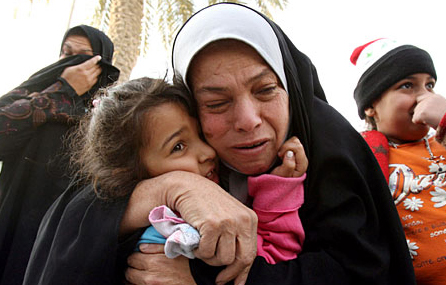Modern slavery -- a continuing global scourge
- By Earl Bousquet
 0 Comment(s)
0 Comment(s) Print
Print E-mail China.org.cn, December 25, 2017
E-mail China.org.cn, December 25, 2017

Slavery comes in many disguised forms in the modern world, such as the act of human trafficking. [File photo]
Recent reports of refugees being bought and sold into slavery in Libya shocked the world – and rightly so. But it also proved that too many people the world over still don't know that slavery still exists today.
Slavery in the modern world indeed comes in many disguised forms, such as the act of human trafficking -- and not all the victims come from Africa.
Indeed, the international organizations combating this global problem point out that there are at least 30 million slaves in the world today.
These people leave the world´s poorest countries to head for the richest, chasing dreams of better lives in promised lands of green pastures filled with milk and honey. However, they eventually find out -- too late in their perilous journeys -- that they were misled by human traffickers taking advantage of their dire conditions to earn big profits quickly.
Not all those who leave home seeking better lives abroad are sold into a modern form of slavery. Many are refugees fleeing wars and economic difficulties, voluntarily undertaking the perilous trips by land and sea with similar hopes of landing better lives.
The main reason millions of refugees from across the world seek to enter Europe has been the open EU invitation to all who wish to flee and come. But as the numbers became overwhelming, Europe started closing its gates, like a fortress pulling up drawbridges and erecting "No Entry" signs at its borders.
Same with the U.S. -- a land built by immigrants, but now, just as quickly, becoming increasingly anti-immigrant in the name of fighting terrorism.
Millions of refugees head to Europe, the U.S. and Canada from every corner of the globe, but not all are bought and sold into a modern form of slavery. Tens of thousands of men, women, children -- entire families – also pay their way across skies and seas, borders and boundaries, ending up working like slaves to repay the high costs of their perilous voyages to the unknown.
Refugees are victims of the worldwide system of cheap labor that´s always in demand in the destination countries, ultimately ending-up doing jobs locals will not do, at wages they would not accept.
In many cases, on arrival in the destination countries, young women are forced to line street corners working as prostitutes, able-bodied men become cheap agricultural laborers, and children end up in homeless centers. Many refugees, when caught, are simply sent back home.
The International Labor Organization (ILO), the International Organization for Migration (IOM) and the UN High Commission for Refugees (UNHCR) all continue to fight this scourge of modern slavery. But their questionable efficacy and insufficiency in achieving measurable success continues to attract increasing criticism.
Indeed, while governments and international agencies always loudly pledge funds to fight human trafficking and improve conditions in the countries home to fleeing refugees, they never deliver on these pledges quickly or fully enough to make concrete and lasting changes to the situation.
During the long pauses between promise and delivery, the perpetrators – human traffickers driven by the perpetual profit motive -- always devise new schemes to keep their ghastly trade going.
Eventually, the blame game naturally sets in: Destination countries place the blame of the refugee and human trafficking problems on the countries of origin and transition states, instead of joining hands across seas, skies and borders to fight this ever-growing international scourge.
As with the arms and drugs trades, the links between human trafficking and organized crime are hardly pursued in Western nations where criminal gangs invariably escape prosecution, as judicial authorities cite the fear of reprisals or insufficiency of indictable evidence.
The Western mainstream media also always revel in highlighting the plight of refugees, but very few do anything substantial enough to help end the happily reported inhuman ordeals.
Global awareness and cooperation between international, state and private sectors can go a long way to address the roots of human trafficking. But promoting awareness and capacity-building for real solutions are always treated as less saucy news than exposure of grave and deadly problems.
As a result, a growing global human problem continues to be treated with less seriousness, the North blaming the South, leaders and institutions opting instead to look right and left, east and west, instead of connecting visible dots with straight lines of communication and cooperation.
The widely reported Libya slavery story was a mere reminder of a global reality that remains in the clear sight of those with eyes to see, but who have long opted to keep looking the other way.
Now, with the "slave sales" story no longer a hot news item, the Western media has effectively dumped it as "old news," in favor of new and more saucy headlines with potential for higher ratings.
Earl Bousquet is a contributor to china.org.cn, editor-at-large of The Diplomatic Courier and author of an online regional newspaper column entitled Chronicles of a Chronic Caribbean Chronicler.
Opinion articles reflect the views of their authors, not necessarily those of China.org.cn.






Go to Forum >>0 Comment(s)